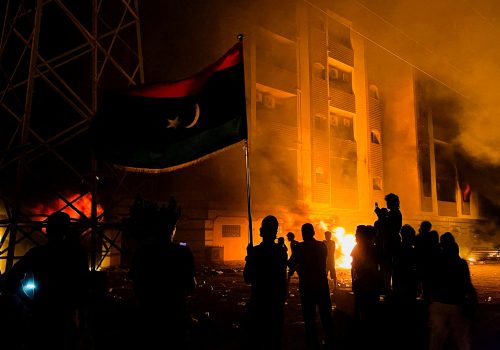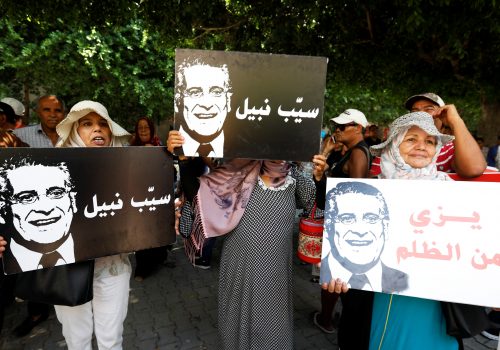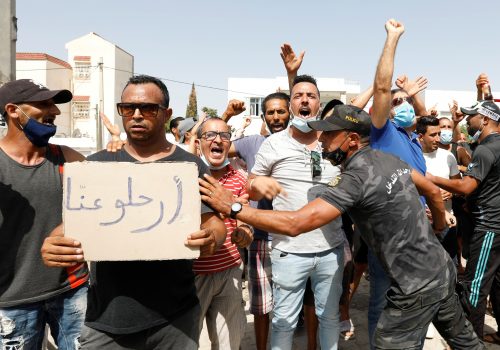Tunisia has a referendum on July 25. Few have as much stake in it as Algeria does.
In the eyes of the army generals and political elites who rule Algeria, their country is an island amidst a sea of chaos. Neighboring Libya is wracked by civil war and the Sahel countries by coups and extremist insurgencies, while Morocco is viewed as a meddling belligerent, particularly since normalizing relations with Israel—one of Algeria’s greatest adversaries.
Although grappling with profound political uncertainty and economic challenges after the 2011 Arab Spring, Tunisia nonetheless looked like an outlier on this troubled map. To keep it that way, Algeria has invested in Tunisia’s stability for years, providing it with cheap natural gas, governmental loans, and other bilateral support.
Thus, Algerian leaders were watching closely in July 2021 when President Kais Saied suspended parliament, dismissed the prime minister, and began ruling by decree—ostensibly to save the country from crisis. This shakeup came at a sensitive time for Algeria’s government, which was already struggling to weather the pandemic and pacify its population after two years of overt contestation.
Following Saied’s soft coup, relations initially remained solid; Tebboune made a state visit to Tunis in December 2021 and delivered a major rescue loan. But Tunisia’s rapidly growing ties with rival Arab nations have stirred mistrust in Algiers, while Saied has broadened his purge of domestic adversaries, fueling protests and deepening uncertainty. Algerian leaders haven’t always managed to conceal their frustration with these choices. The irritation grew mutual in May when Algerian President Abdelmadjid Tebboune—disregarding his own country’s checkered democratic credentials—told reporters that Algeria stood ready to “help Tunisia overcome the current crisis and return to the democratic path.”
While Tunisians may bristle at the sanctimonious tone, Algeria remains genuinely worried about the possibility of instability in Tunisia, which is being pummeled by spiraling global grain prices and now risks a major debt default. To help, Algeria has just reopened its borders with Tunisia—closed for over two years amid the pandemic—hoping to inject much-needed trade and tourism revenue. Algeria’s tougher stance in ongoing renegotiation of gas deals, however, is a reminder that its willingness to help has limits, particularly when its core interests are at stake).
Presently, Algiers is most nervous about the July 25 referendum on Saied’s proposed new constitution, which critics have slammed as an un-democratic reversal of Tunisia’s post-Arab Spring gains. Perennially focused on short-term stability over democratic principles, Algerian leaders fear that, if Tunisians reject the constitution, they will plunge their country into an all-out crisis. Earlier in July, Tebboune used Algeria’s independence celebration as an opportunity to convene Saied and Noureddine Taboubi, secretary general of the powerful Tunisian General Labor Union (UGTT), for a meeting in Algiers. But the talks were as much about reinforcing Algeria’s self-perception as a regional peace broker as they were about genuine substance. Saied and Taboubi had already been meeting back home and, three days earlier on July 2, Taboubi had announced that UGTT would abandon its call for union members—who number a million amid an electorate of some nine million—to boycott the referendum. Taboubi has thus far refused to go further and explicitly encourage members to vote—a position left unchanged by the Algiers meeting.
However, most Tunisian opposition parties continue calling for voters to boycott the referendum, decrying the substance of the proposed constitution and how it was drafted. It’s a familiar refrain for Tebboune. Elected in 2019 against the backdrop of a popular uprising, Tebboune put a new constitution to a vote the next year and saw it pass with support from fewer than 14 percent of eligible voters. Disorganized and cynical about prospects for change, Algeria’s popular opposition had fallen back on old habits and called for a boycott, but, in so doing, missed a rare opportunity to stymie leaders’ plans and force them to heed popular demands.
Is Tunisia’s opposition drawing lessons from that Algerian experience? Ties between the two peoples are many, including among civil society and political parties, so channels exist for such messages to pass—if those are the lessons Algeria’s opposition learned and that Tunisia’s wants to hear. Given the continued calls for boycott in Tunisia, however, that appears doubtful. As in Algeria, boycott won’t prevent Saied’s constitution from passing and is unlikely to change anyone’s opinion of its legitimacy. Algeria’s short-sighted leaders will be relieved to see it pass, however narrowly, so long as it moves Tunisia past this sensitive moment.
Whatever the outcome, the referendum won’t end Algeria’s concerns about its smaller neighbor, not least because rumors are now swirling that Tunisia could be the Arab world’s next domino to fall to normalization with Israel. If that happens, it would destroy one of Algeria’s oldest alliances and leave it pinned between two Israeli allies, exacerbating the leaders’ siege mentality. It could also have domestic ramifications in Algeria, where the population overwhelmingly supports the Palestinian cause and rejects Israeli advances in the region. But Algeria has already been struggling of late to shape regional affairs to its liking, despite the considerable leverage afforded by its oil and gas wealth. For these reasons, little Tunisia presents a big test, and Algeria will continue taking an active and interested role in Tunisian affairs well beyond the July 25 referendum.
Andrew G. Farrand is a nonresident senior fellow with the Atlantic Council’s Middle East Programs. He is the author of The Algerian Dream: Youth and the Quest for Dignity.
Further reading
Thu, Jul 7, 2022
Libyans are protesting. What can they learn from the events rocking Tunisia?
MENASource By Karim Mezran
Tunisia is experiencing one of its most difficult moments since its independence from France in 1956.
Thu, Sep 5, 2019
Is the early presidential election a political turning point for Tunisia?
MENASource By
The results of the next Tunisian presidential election may change the political spectrum for the subsequent legislative elections too. During the last eights years, the political paranoia has been the rule, leading public opinion to discredit politicians and political parties.
Tue, Jul 27, 2021
Experts react: What’s next after Tunisian president’s parliamentary freeze?
MENASource By
On July 25, President Kais Saied invoked Article 80 of Tunisia’s constitution to sack Prime Minister Hichem Mechichi and dissolve parliament. Atlantic Council experts react to the events, assess the impact on the fledgling democracy, and offer their thoughts on how the international community may respond.
Image: Tunisian President Kas Saied during the arrive of the Algerian President Abdelmadjid Tebboune at Tunis-Carthage airport as part of their working visit to Tunisia to treat the relations of cooperation and partnership as well as to consolidate consultation and coordination between the leaders of the two countries on topical issues. On December 15, 2021 in Tunis, Tunisia. (Photo by Hasan Mrad/ Eyepix Group)


